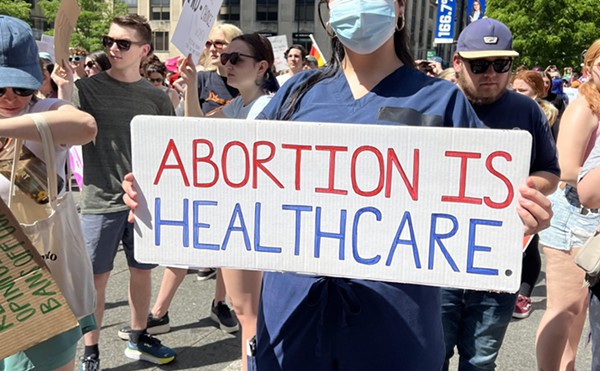|
The race in Ohio's 1st Congressional District offers a clear choice between candidates with opposing views on many issues.
U.S. Rep. Steve Chabot (R-Westwood) has represented the district — which includes central areas such as Clifton, Norwood and Over-the-Rhine along with outlying communities as far west as Harrison — since 1995. His campaign theme, "Working Hard for Working Families," aims at the suburban neighborhoods that have been his stronghold.
His challenger, Democrat Greg Harris, says Chabot is out of touch with the people he represents. Harris, who has worked to improve communities as part of Citizens for Civic Renewal, has received numerous endorsements from unions.
On many issues, the differences between the two are obvious. Chabot refers to himself as "staunchly pro-life" while supporting the death penalty. He supports the Bush Administration's actions in Iraq.
Harris is against the death penalty for federal crimes and has a conditional but liberal stance on abortion. He opposed the invasion of Iraq.
"I am deeply bothered that we're spending twice as much on rebuilding Iraq as we are on securing our nation against terrorist attacks," Harris says.
It's the tuition, stupid
Both candidates have been educators, Chabot at the high school level and Harris in college. But their views on education funding are markedly different.
Pell grants are an important component of affordable higher education for many in the 1st District. The maximum grant award per year is $4,050, an amount Chabot correctly calls "an all-time high." But undergraduate tuition for Ohio residents at the University of Cincinnati is $7,005 a year — leaving nearly $3,000 for students to pay, and these are students who have already met U.S. Department of Education standards as being in financial need.
Many students are forced to turn to student loans. But that's not so bad, according to Chabot.
"Interest rates are at an all-time low," he says, adding that he's worked to "encourage people to save for high school and college by putting money into tax-free savings accounts."
But for low-income students, that leaves the question of how to save what they don't have.
Harris proposes to immediately increase the amount of Pell grants and to provide the first two years of college at public institutions.
"The first two years of college should be as common as a high school diploma," he says. "The amount for subsidized student loans should also be increased."
In Cincinnati, few recent developments have led to as much positive national attention as the arts. New buildings, facility expansions and an active artist population have provided much-needed optimism.
"If you aren't into the arts for their cultural value and all you care about is the bottom line, then you should be for the arts," Harris says. "In this region, the greatest economic generator is arts and culture. They far outdraw the two stadiums and bring in more business."
Some funding for major exhibitions, education and even individual artists comes from the National Endowment for the Arts (NEA). Chabot, however, doesn't support the NEA.
"I don't think that, especially at a time when we don't even have a balanced budget, we ought to be funding programs that in my opinion ought to be funded at the local level or the state level or by private individuals or institutions," he says. "I don't think that the federal government ought to be funding the arts. I also think there is undue influence if the feds are picking what kind of art to fund."
Make them afraid
The American Civil Liberties Union gave Chabot a failing grade. But he says he's not against civil rights.
"I don't think so at all," he says. "In fact, I'm sure I'm not."
Chabot points out a recent effort to assist African-American farmers.
"We just had a hearing in Congress on black farmers, which hasn't been a big issue in this country as to the fact that people have heard about it," he says. "But the Department of Agriculture discriminated against black farmers and wasn't giving them loans that they would give for white people."
But that answer points to something seriously amiss, according to Harris.
"What's especially frustrating is that a congressman who represents a district with the highest minority voting-age population of any district in the country represented by a Republican, in his policies pretty much writes off the concerns of that population," Harris says. "He focuses on tokenism and dividing people."
Harris' passion for civil rights is palpable. The grandson of a Cuban immigrant, he's been a longtime advocate for underprivileged youth, which tends to include a disproportionate amount of immigrants and minorities.
"Chabot is more interested in issues like abortion and gay marriage, ideological issues that don't speak to our daily lives," Harris says.
Chabot has received much praise for his crusade against tax increases.
"We need to continue to improve the economy," he says.
Chabot ranks job creation as a top priority. But he discounts criticism of the Bush Administration over job loss.
"It is the same (unemployment) rate as when Bill Clinton was running against Bob Dole for re-election back in 1996 and Clinton was bragging about how great the economy was," Chabot says.
His support of Bush's tax cuts and tax cuts on savings and investments, however, sometimes stumbles over political reality. Chabot's Web site claims, "With a tax burden that is the highest in peacetime history, families are hurting."
Problem: We're not in peacetime.
Harris views Bush's tax cuts as veiled debt.
"He supported over $1 1/2 trillion in tax cuts, 52 percent of which go to the wealthiest 1 percent of Americans," Harris says. "But they aren't even tax cuts, because there isn't a way to pay for them. It's not like (they) identified $1 1/2 trillion in spending cuts over the next 10 years to pay this. So they aren't tax cuts, they are deferred tax increases paid for by our children and grandchildren. That's not just reckless fiscal policy. That's immoral."
Although Chabot beat him in 2002, Harris is hopeful about unseating him this year. He's especially hopeful about the increased political involvement of young voters.
"The younger generations should make politicians fear them, fear their clout and fear their influence on the electoral process," Harris says. ©





